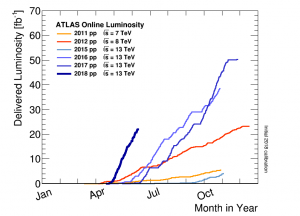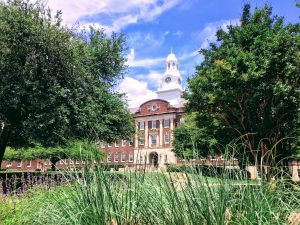
I’ve decided to use my blog to reflect on my summer research activities as they unfold. I find such reflection not only useful for thinking about what is accomplished and what is not, but also to communicate to an audience some of the aspects of the research life of a particle physicist (at least, one that has to travel to a remote site just to do their research).
This past week was a travel week for me, kicking off my time at CERN for the next few weeks. Prior to that, I visited my parents to get some much-needed rest and relaxation, as well as to (most importantly) spend time with family I don’t get to see very often due to teaching and research duties throughout the year. I arrived at CERN late on Wednesday (later than anticipated), and hit the ground running on Thursday.
Pre-CERN: Between Teaching and Recovery from Teaching
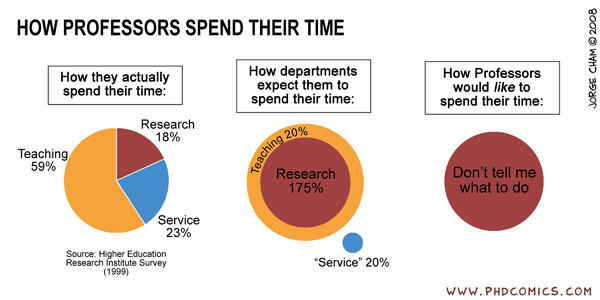
Despite the fact that I took on a leadership role in the ATLAS Trigger system in January, I was handed an entirely new course to teach for the spring term. Since it’s not in my nature to half-ass my teaching, I committed myself to implementing my “flipped-classroom” style (augmented with peer instruction and a little just-in-time-teaching) for my new course, PHYS 1303 (introduction to mechanics). I’ve commented on the structure of this course in previous posts in this blog.
I started 3 weeks ahead of schedule on lecture videos, but research commitments necessarily took their toll on my teaching lead and by mid-term I was barely keeping up with my own course. A hefty push in the last third of the class got me over the finish line, and seems to have overall left a positive impression on the students in the class.
Of course, the end-of-term was not without some of the usual antics that appear as stereotypes of university student behavior. One student who barely interacted with me the entire semester asked, after preliminary final grades had been generated, what they needed to do to get a “B” in my class. Without getting into specifics, a “B” was not in the cards for them; they had far from earned it. I give students ample opportunity to interact with me throughout the semester, and while nearly all of the students in the class were mature and professional as the class wrapped up, this one fell into the “tropes” category and grated me a little.
It’s important in situations like that not to be snarky, but to be firm and professional. Students don’t “get” a grade; they “earn” a grade (as my father likes to say). Certainly, at the margins of any student’s grade there are fuzzy bits in how a specific assignment or problem might have been evaluated, and that leaves some room for slight movement in grades at the end of the course if a student is willing to do their homework, curate their feedback from instructors, and engage directly with the instructor in a dialogue about assessment. That is a process I respect. But the faceless emails about “how to improve my grade” after final grades are essentially baked-in deserve one response: a polite, but firm, reminder of the lateness of this inquiry coupled with information about how the course was laid out since (before) week 1. Keep it factual. No snark. No sarcasm. Facts alone have their own power to sting without the need for a contrived stinger.
Emotionally, however, such things wear me down. Like water dripping on a rock, each such moment is small but the net effect is a kind of emotional weathering. At least, that is what happens to me. After such things, I need rest and distraction. I started tending the yard at home again. That brought a certain peace and satisfaction as I replanted trees, expanded the drip-watering system, managed the lawn, planted loofah, and picked strawberries.
I started exercising again. It got too hot in Texas to run in the afternoon; I made that mistake precisely once. I started going to sleep in my running clothes and waking up, feeding the cats around 6am, and hitting the road as soon as possible. At first, exercise was hard; I have been getting more and more out-of-shape as this semester took its toll. Once I got over the initial hurdles of my limited running range, coupled with added attention to stretching to avoid damaging my hamstring again, I started to feel much better. My stress levels dropped and my ability to focus on tasks returned.
I attended to my diet as well. Months of choosing to eat take-out food had also taken its toll, not on weight (well… also on weight) but on digestion. I was battling weekly bouts of nausea. Turns out this was probably diet-related. Once I started cooking for myself, especially putting more fruit and veg back into my diet while varying my proteins, my digestive struggles abated. Could be placebo. Could be coincidence. But I don’t care; eating better is better for its own sake. If, in doing the right thing, I solved an actual problem as well, so be it.
I even started cooking for myself again. I enjoy cooking, but when I have to get up early to attend meetings, then commute to SMU, then attend more meetings, than catch up on teaching work, then try to get some research done, then commute home at the height of rush-hour traffic, the LAST thing I want to do it start a meal from scratch when I get home. So I had spent my money, not on groceries, but on restaurants and take-out. Once I seized control of my time again after teaching, I was able to put cooking back in the mix. It was deeply satisfying. I even finally found the best temperature setting on our gas stove top for cooking an omelette to near-perfection.
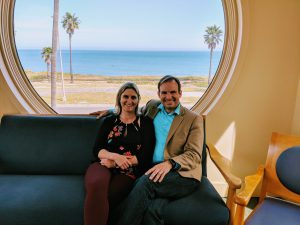
The worst thing of all … the absolute worst, worst, worst thing of all … has been the separation in space from Jodi. She’s been based at UC Santa Barbara since April, when she relocated there for a cold dark matter program run by the Kavli Institute for Theoretical Physics. This is an unfortunate but natural condition for us in our profession. She hunts for dark matter. I do collider physics. Rarely do these endeavors intersect in the same place, and her opportunities are distinct from my opportunities. I am happy she’s been able to spend a lot of time with experts in her field, in a place where there is an intellectual reward and a professional respect for what she does and how she does it. That makes me happy, because it rejuvenates her own research activities. But the separation leaves a mark, and it’s not easy. I was glad she came back for her Ph.D. student’s thesis defense (he passed!), and I was glad she came back for graduation, and I was glad I got to visit her in early May… but the sad truth is that we haven’t seen each other since SMU commencement in mid-May, and we won’t see each other again until almost July.
A few days of rest and reflection
Before coming to CERN, I needed to take a few days to be away from Dallas and away from my normal life. I had wanted to visit my parents in early May, but my trip to KITP had to be then or never. So, instead, I went to Connecticut for a few days in early June and then left for CERN from New York. It was nice to get away from the increasingly brutal temperatures in Dallas (it was to be 102F the day after I left for CT) to the more varied and pleasant summertime weather in Connecticut (though I know, thanks to our self-inflicted climate wounds, that such weather only very recently arrived in New England).
As always, it was wonderful to see my parents again. I had good food, got to exercise outside again during the day time (what an oddity!), and started catching up on sleep. There is something truly satisfying at my age to go to sleep at 08:30 and get 9 hours of sleep before waking refreshed under your own power. So satisfying. So good for my brain.
After a few days of real recovery, I grabbed a train from Old Saybrook and went to JFK Airport to catch my flight to Geneva.
To CERN
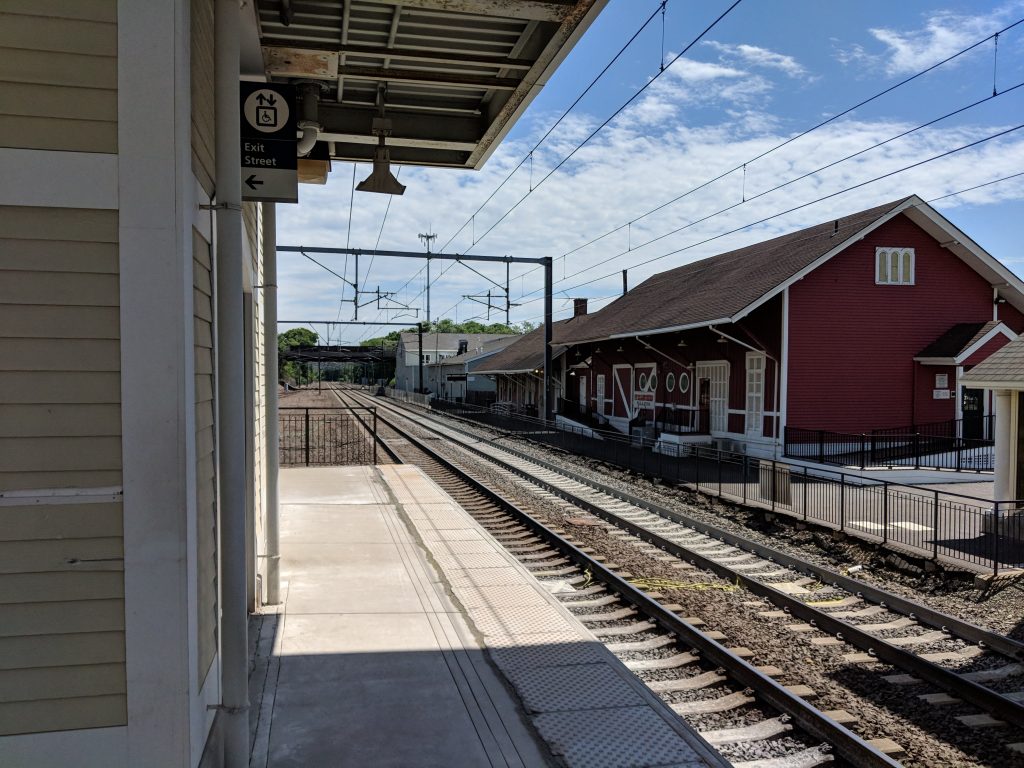
I broke my travel rhythm from the past couple of years. Normally, this time of year, I’d fly to Paris and then take a train to Geneva. I like trains, and it’s not much difference in price from other flight options (it’s often overall cheaper). This time, I took a train from CT to New York City, then took the Long Island Railroad to the Jamaica station, where you can grab a train to JFK airport. From there, I flew to London, and from there I connected to Geneva. I was supposed to land in Geneva around 2pm local time, but mechanical problems with the flight out of London delayed my landing until almost 5pm.
By the time I got to CERN, I’d missed the afternoon meetings I had hoped to attend (in person, for a change!) and was just alive enough to check into the CERN hostel, say hello to my research colleagues in the SMU group, and then grab dinner and crash.
I don’t usually mind too much going through London, especially because I select a long layover there to avoid being too rushed. On my way to my connecting terminal, I met a person on my flight from JFK who attended SMU, now lives in Switzerland, and is working as an alumni ambassador for the university. It was a very fortunate meeting, and I hope the fact that we have people located at CERN could be an asset to her efforts.
A couple of days in the lab
Now that I am settled into CERN, I have started to get some research done again. I’ve been trying to help colleagues in the ATLAS b-jet trigger group (the one I co-lead with my colleague, Carlo Varni) to make progress on their work. That’s been very satisfying (I’m meeting some of these people face-to-face for the very first time!). In addition, it’s been good to reconnect with students and the post-doc that I work with. We’re well into the cycle of preparation for summer conferences, with the International Conference on High-Energy Physics (ICHEP) coming up in just a few weeks. This place is busy like a beehive (though it will be quiet next week as the summer ATLAS Week is in Japan), and it’s delightful to be working here again.
I’ve managed to complete a paper review, helped our post-doctoral research edit a note documenting work he supervised over the past 6 months (really good stuff, too, done by a student funded through an awesome INFN fellowship – that work will benefit one of the ATLAS analyses we work on), wrote some code to help compute the amount of data processed by a colleague for a study they are leading, and started some other code projects intended to archive and maintain code that has not previously been officially part of our ATLAS trigger effort. I’ve also been listening in on discussions about the ATLAS Run 3 software framework, and how that may impact triggers – that’s really interesting stuff, and the work already started years ago to set all this in motion, even though Run 3 is about 3 years away!
And it’s always good to talk about physics and analysis with the students and post-doc I work with. They are the ones in the trenches all the time. My goal is to set them loose and guide them as best I can, without interfering too much unless it becomes absolutely necessary. That means I have to catch up from time-to-time, because I’m not a micro-manager (at least, I don’t think I am), but it’s good to get a core dump of information about ongoing physics projects over coffee.
In addition, I am working with an undergraduate student this summer. She is back at SMU, so my remote communication now goes the other way – from CERN to Dallas. Her project is a really interesting one involving the details of hadronization, especially in the decay products of a Higgs boson. It’s part of a long-term project that, if viable, might pay off in Run 3.
Ahead
The week ahead is ATLAS Week, which means fewer regular meetings because of all the special meetings going on. But, they are going on in Japan, at totally different times than regular meetings here in Geneva. So I suspect I’ll still have plenty to do next week.
It’s also important to note that the data-taking that has been ongoing with the LHC since the restart of operations in April has been amazing. The flood of data that will be available for full Run 2-based analysis efforts is going to be incredible; already, ATLAS has collected 80/fb from 2015-2017 that is good for physics analysis, and just this year in two months the LHC has added about 21/fb more to the pile, bringing us over 100/fb of (probably) good data for Run 2. And we have months of data-taking to go!
